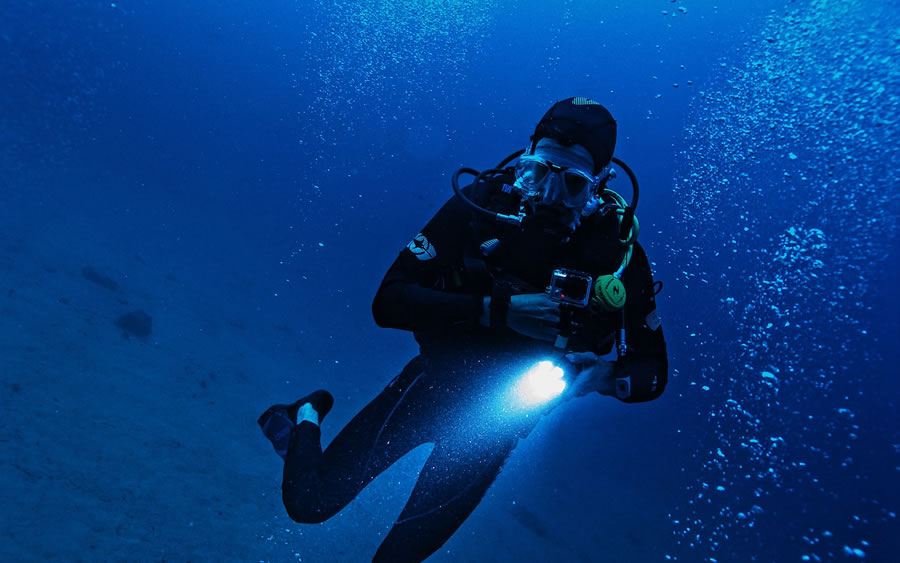🌍 6 Tips on How to Stay Safe While Scuba Diving

If you are the type of person who is looking for adventure even when he is going on holiday, then you definitely know everything about scuba diving. You know how good it feels to be surrounded by the calm and natural beauty you find underwater. All these combined with adrenaline make an unforgettable and addictive experience. Having the chance to escape from the world at the surface and dive into a totally different environment makes you feel that you are one of the luckiest people on earth.
Furthermore, the adrenaline gets even higher when you go to one of the most dangerous scuba diving sites in the world. When you reach such places, you understand that the bigger the danger, the more beautiful the scenario.
You can read all about scuba diving on the web as there are a lot of divers who are eager to share their experience and tips and tricks they learned. All that information can be found on a variety of blogs and writing websites and social media. But still, there is one thing you cannot skip no matter how much you`ve read. Scuba diving classes.
When you take scuba diving classes, one of the first things you will learn are the safety lessons. Anything can happen while you dive, and this determines scuba diving teachers to stress a lot the importance of safety measures. If you want to learn more about how to stay safe while scuba diving, then this article is going to tell you more about it.
- Don’t hold your breath
According to Boyle’s law, your lungs will expand if you ascend and contract during descent. Therefore, if you hold your breath during scuba diving, you risk creating the lung wall’s rupture. The air won’t be able to expand and thus provoke serious injury to your lungs. This is one of the first lessons every entry-level diver will learn. As long as you keep breathing normally, you won’t experience any problem. When you start descending, you might get into panic and have the tendency to hold your breath. Thus, knowing this rule and keeping it in mind will keep you safe while diving.
- Plan your dives in advance
Even though the adrenaline is high, you cannot start diving if you don’t plan things ahead. Your Dive Master will tell you before descending everything about the place you are going to explore. Pay attention to the route you are going to follow and discuss with your master about any event that might occur during your scuba diving session. You also need to know the maximum depth you are going to and how much time you are going to spend into the water. Planning is always a good exercise to make sure that you come back safe and sound. Knowing everything about the possible dangers you might encounter will keep you away from any danger.
- Check the safety of your equipment
It doesn’t matter if this is your first or the 10th diving you have. You still need to take the necessary safety measures before diving. One of them is checking your equipment approximately one week before diving. Why so early? When you check your equipment, you will make sure that everything has been serviced and maintained properly. Therefore, in case you discover something is wrong, you have enough time to repair it and not ruin your scuba diving plans. One of the most important elements you should check are the batteries from your dive computer and underwater torch.
- Know your limits
Scuba diving should be fun. Therefore, you should stop immediately before putting yourself in an uncomfortable situation. You usually do scuba diving while you are on holiday. Thus, you want to come back with a lot of fun memories, and not remembering an unpleasant situation. So, if you feel that you are not physically or mentally prepared to go for a dive, then you simply shouldn’t go. This is a sport where no one forces you do something you don’t want. If you felt well in one day and easily went diving, this doesn’t mean that tomorrow you will feel the same. This is why it is always better to listen to your mind and body before diving and not push your limits.
- Stay in a physically good shape
Scuba diving is very physically demanding. Even though the time spent underwater is relaxing, you still need to take into account that you will be swimming a lot and might meet strong currents along the way. You will also need to carry your gear and there might be occasions when you might dive during extreme weather conditions. If you are not in good shape, you might get exhausted very fast and might panic when you meet with an unforeseen situation. What is more, it is not only your fitness shape which is important, but also your overall health. Even though health might not seem dangerous on land, it can cause you trouble underwater. This is why you should start taking care of your overall well-being months before your diving season. Eat nutritious food, rest well and eliminate causes of stress. If you are a student, it is worth getting some academic assistance from a service like Custom Essay Meister to manage deadlines and get enough quality sleep. Even though health might not seem dangerous on land, it can cause you trouble underwater.
- Use the buddy system
There are several organizations offering solo certifications. However, it is not recommended to dive alone even though you are an experienced diver. There are many emergency situations you might face while scuba diving. Therefore, it is always better to have someone next to you who can give you a hand. Furthermore, if you don’t have a friend passionate about scuba diving, this doesn’t mean that you cannot find someone to be your buddy in this adventure. Your trainers can pair you with other scuba diving enthusiasts who got the same certification. So, before you go diving, you should meet your buddy, have a short talk on the area you are going to explore and discuss any concerns you might have.
Staying safe while scuba diving is not complicated all. You will need careful preparation and a lot of confidence before you go on your first scuba diving experience. Always remember that this is a fun and relaxing activity which is going to energize you a lot. As long as you know the potential risks and learn how to avoid them, you don’t have to worry that something bad might happen to you. Take always a buddy with you and share all your experience and concerns with your masters.
Author’s bio.

Jessica Fender – jess.j.fender@gmail.com is a professional writer and educational blogger at GetGoodGrade, an aggregator for useful college resources and websites. Jessica enjoys sharing her ideas to make writing and learning fun.
Last Updated on April 29, 2021

